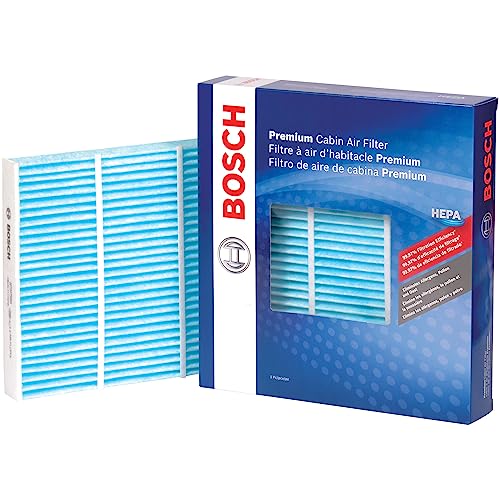Do you find yourself sneezing and sniffling every time you get in your car? It might not just be the pollen outside! Your car’s air could be full of dust, mold, and other yucky things that trigger allergies. Did you know that the air inside your car can sometimes be worse than the air outside? Yikes!
Choosing a good car cabin air filter can be tricky. There are so many filters out there. How do you know which one will actually help you breathe easier? You might feel confused about the different types and what they do. Plus, you don’t want to waste money on something that doesn’t work!
This blog post is here to help! We’ll break down everything you need to know about car cabin air filters for allergies. You’ll learn what they do, how to choose the best one for you, and how to keep your car’s air clean. Get ready to say goodbye to allergy symptoms and hello to fresh, clean air on your next drive! Let’s dive in and find the perfect filter for you.
Our Top 5 Car Cabin Air Filter For Allergies Recommendations at a Glance
Top 5 Car Cabin Air Filter For Allergies Detailed Reviews
1. ECOGARD XC36080 Premium Cabin Air Filter (One Pack)
Rating: 9.2/10
The ECOGARD XC36080 Premium Cabin Air Filter (One Pack) is a helpful product. It is made in China and comes with one filter. This filter works hard to clean the air in your car. It gets rid of dust, pollen, and other nasty things. This helps you breathe easier when you drive. It also protects your car’s air system.
What We Like:
- It removes almost all bad stuff from the air.
- It keeps your car’s air system working well.
- It helps your car’s airflow.
What Could Be Improved:
- The origin country is China.
This cabin air filter is a good way to keep the air in your car clean. You can breathe better and protect your car with this filter.
2. Spearhead HEPA Breathe Easy Cabin Filter
Rating: 9.5/10
The Spearhead HEPA Breathe Easy Cabin Filter (BE-157H) promises cleaner air inside your car. It traps tiny particles, even those you can’t see! This filter can catch up to 99.97% of particles as small as 0.3 microns. That’s smaller than you can imagine. It’s designed to keep the air flowing freely, so your car’s fan works well.
What We Like:
- Filters tiny particles. It can catch particles 95% smaller than a red blood cell.
- Keeps air flowing smoothly. This filter is made to let air pass through easily.
- Makes breathing easier. It can help with sneezing, coughing, and bad smells.
- Easy to install. You can replace it yourself and save money.
- Simple promise. The company wants to make it easy to choose their product.
What Could Be Improved:
- None mentioned in the provided text.
If you want cleaner air in your car, this filter is worth checking out. It seems like a good choice for people who want to breathe easier on the road.
3. BOSCH 6092C HEPA Cabin Air Filter – Compatible with Select Subaru Ascent
Rating: 8.6/10
The BOSCH 6092C HEPA Cabin Air Filter is made to clean the air in your car. It works in many Subaru and Toyota vehicles. This filter helps keep your family safe from bad air. It traps tiny particles like dust and pollen. It is a great way to breathe cleaner air while you drive.
What We Like:
- This filter meets HEPA standards, which means it is very good at cleaning the air.
- It traps 99.97% of tiny particles.
- It has strong layers to catch more stuff.
- It is made to last and work well for a long time.
- It does not add any smells to the air.
- It fits many different cars.
What Could Be Improved:
- You need to check if it fits your car model before buying.
- You must replace it every year.
This BOSCH HEPA filter is a good way to keep your car’s air clean. You can breathe easier. This filter is a smart choice for you and your passengers.
4. BOSCH 6029C HEPA Cabin Air Filter – Compatible With Select Acura CSX
Rating: 8.7/10
The BOSCH 6029C HEPA Cabin Air Filter is made to clean the air in your car. It works with many Acura and Honda models. This filter traps tiny particles that can make you sick. It uses HEPA technology to clean the air. This means it catches 99.97% of particles that are 0.3 microns big. This filter will give you and your family the cleanest air possible while you drive.
What We Like:
- It removes almost all tiny particles from the air.
- It is made to meet HEPA standards for clean air.
- The filter uses a special design to trap more particles.
- The filter is made to last a long time.
- It does not add any smells to the air.
- It fits many Acura and Honda cars.
What Could Be Improved:
- You need to check if it fits your car’s exact model.
This BOSCH HEPA cabin air filter is a good choice for clean air. It is a smart way to make the air in your car better.
5. PureFlow HEPA Cabin Air Filter PC99273HX
Rating: 8.9/10
The PureFlow HEPA Cabin Air Filter PC99273HX is designed to give you cleaner air in your car. It fits specific Kia Niro, Hyundai Ioniq, and Kia Niro EV models. This filter uses multiple layers to clean the air. It aims to remove allergens, odors, and other bad stuff from your car’s cabin. It is a good choice for drivers who want to breathe better air while driving.
What We Like:
- The HEPA filter captures 99.97% of tiny pollutants, like pollen. This helps people with allergies.
- Activated charcoal and baking soda help remove bad smells.
- The filter uses advanced technology to clean the air.
- It is made to fit specific Hyundai and Kia models.
What Could Be Improved:
- The HEPA filter might slightly reduce airflow.
This PureFlow HEPA Cabin Air Filter is a good way to improve the air quality in your car. It is a solid choice if you want to breathe cleaner air while you drive.
Breathe Easy: Your Guide to Car Cabin Air Filters for Allergies
Are allergies making your car rides miserable? A good car cabin air filter can help! This guide will help you pick the best one to fight off those pesky allergens.
1. Key Features to Look For
You need a filter that does the job. Here are some important things to consider:
- HEPA Filtration: This is super important! HEPA stands for High-Efficiency Particulate Air. HEPA filters catch tiny particles. They trap pollen, dust mites, and other allergens. Look for filters that say “HEPA” on the box.
- Activated Carbon: Some filters have activated carbon. This helps remove odors and gases. It can also help with smoke and other pollutants.
- Multiple Layers: Many filters have several layers. Each layer catches different things. This makes the filter more effective.
- Easy Installation: You don’t want a filter that’s hard to put in. Make sure the filter fits your car model. Check the instructions before you buy.
2. Important Materials
The materials used matter a lot. They determine how well the filter works.
- Filter Media: This is the main part that does the filtering. Look for filters with good quality filter media. This could be pleated paper or synthetic fibers.
- Frame: The frame holds the filter in place. It’s usually made of plastic or cardboard. Make sure the frame is strong and fits your car.
- Activated Carbon: If the filter has activated carbon, it should be a good quality. This helps with odor removal.
3. Factors That Improve or Reduce Quality
Not all filters are created equal. Some things make a filter better or worse.
- Filter Design: A well-designed filter works better. It should have enough surface area to catch particles.
- Material Quality: Better materials mean a better filter. Cheaper materials might not work as well.
- Brand Reputation: Some brands are known for making good filters. Research the brand before you buy.
- Certification: Look for certifications. These show the filter meets certain standards.
4. User Experience and Use Cases
How will the filter work for you? Think about how you use your car.
- Allergy Sufferers: If you have allergies, a good filter is a must-have. It will remove allergens from the air.
- City Drivers: If you drive in the city, you face more pollution. A filter with activated carbon can help.
- Pet Owners: Pet dander can cause allergies. A good filter can help remove pet dander.
- Smokers: If you smoke in your car, or are around smoke, a filter can help with smoke and odors.
- Regular Replacement: Remember to replace the filter regularly. Check your car’s manual for the recommended time. Usually this is every 12,000 to 15,000 miles or once a year.
Frequently Asked Questions
Here are some common questions about car cabin air filters:
Q: What does a car cabin air filter do?
A: It cleans the air that comes into your car’s cabin.
Q: How do I know if I need a new filter?
A: If you have allergies, you might notice more sneezing or watery eyes. You may also notice bad smells in your car.
Q: Where is the cabin air filter located?
A: It is usually behind the glove box, under the dashboard, or under the hood. Check your car’s manual.
Q: How often should I replace my car cabin air filter?
A: Most manufacturers recommend replacing it every 12,000 to 15,000 miles or once a year.
Q: Can a cabin air filter remove all odors?
A: No, it can’t remove all odors. But filters with activated carbon help remove some odors.
Q: Do all car cabin air filters have HEPA filtration?
A: No, not all do. Look for filters that say “HEPA”.
Q: Can a cabin air filter improve my car’s gas mileage?
A: No, it doesn’t. It’s job is to clean the air.
Q: How do I install a cabin air filter?
A: It’s usually easy. Check your car’s manual for instructions.
Q: What is the difference between a cabin air filter and an engine air filter?
A: A cabin air filter cleans the air you breathe inside the car. An engine air filter cleans the air that goes into your engine.
Q: Where can I buy a car cabin air filter?
A: You can buy them at auto parts stores or online.
In conclusion, every product has unique features and benefits. We hope this review helps you decide if it meets your needs. An informed choice ensures the best experience.
If you have any questions or feedback, please share them in the comments. Your input helps everyone. Thank you for reading.

Hey there, My name is Joe Martin & I’m the author of OffroadersGuild.com. I’ve been hitting the dirt for a while now. I’ve been off-roading in all sorts of vehicles, from Jeeps to trucks and everything in between.
I’ve also built and modified a few off-road vehicles of my own, so I know what works and what doesn’t when it comes to upgrading and modifying off-road vehicles. I started this website to share my experience and help others get the most out of their off-roading adventures. Let’s hit the trails!





